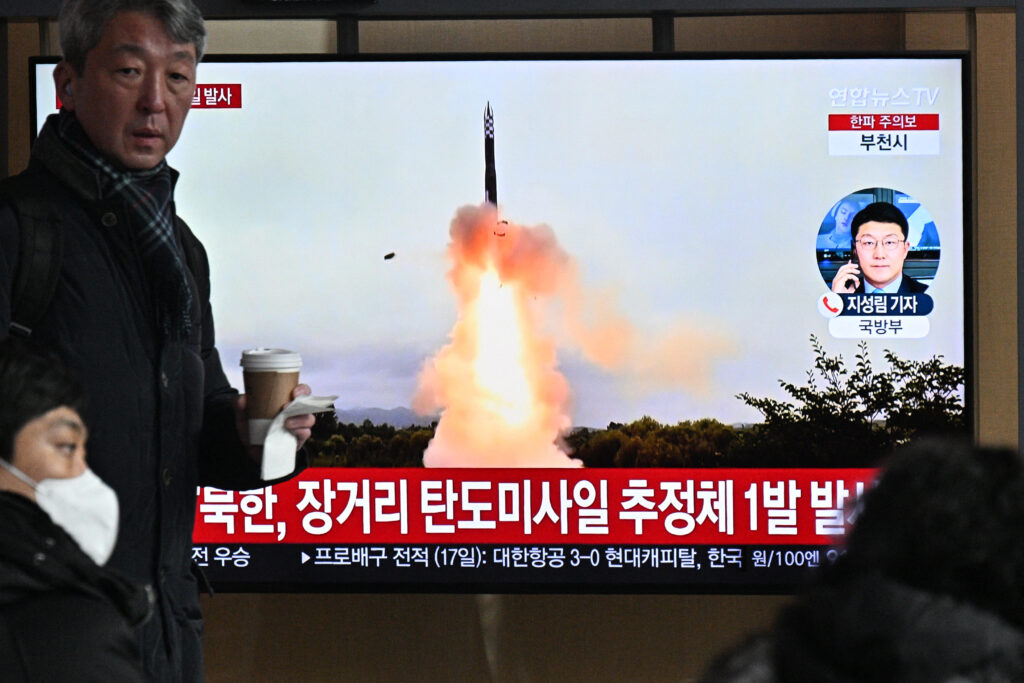
A man walks past a television screen showing a news broadcast with file footage of a North Korean missile test, at a railway station in Seoul on December 18, 2023. North Korea fired another internationally banned “long-range ballistic missile” on December 18, the South’s military said, after Pyongyang voiced outrage over deeper nuclear cooperation between Seoul and Washington. (Photo by Anthony WALLACE / AFP)
Seoul, South Korea—North Korea fired another internationally banned “long-range ballistic missile” on Monday, the South’s military said, after Pyongyang voiced outrage over deeper nuclear cooperation between Seoul and Washington.
The ballistic launch followed firing overnight Sunday by the North of a short-range missile, extending a record-breaking number of weapons tests this year that have been condemned by the West.
The back-to-back launches also come after another bout of fearsome rhetoric between North Korea and the US-South Korean allies.
READ MORE: North Korea fires ballistic missile, 12th this year – S.Korea
The United States and South Korea on Friday held their second session of the Nuclear Consultative Group in Washington, where they discussed nuclear deterrence in the event of conflict with the North.
On Saturday they warned that any nuclear attack from Pyongyang on the United States and South Korea would result in the end of the North Korean regime.
A spokesperson for North Korea’s defence ministry on Sunday slammed the allies’ plans to expand annual joint military exercise next year to include a nuclear operation drill.
“This is an open declaration on nuclear confrontation to make the use of nuclear weapons against the DPRK a fait accompli,” said a statement carried by the KCNA news agency, using the official acronym for North Korea.
READ MORE: North Korea fires 2 short-range ballistic missiles after US submarine arrives in South Korea
“Any attempt to use armed forces against the DPRK will face a preemptive and deadly counteraction,” it added.
On Monday morning, South Korea’s Joint Chiefs of Staff said its military had detected a “suspected long-range ballistic missile launched from the Pyongyang area”.
It said it had been fired into the East Sea, referring to the body of water also known as the Sea of Japan.
The JCS added the military had heightened its alert posture and was “closely sharing information regarding North Korea’s ballistic missile with the United States and Japan”.
The Japanese government confirmed the North Korea fired “what appears to be a ballistic missile(s)”.
Japan’s Coast Guard said the missile “appeared to have already fallen” and warned vessels to stay away from fallen objects.
‘Destabilizing impact’
Sunday’s short-range missile launch came as Pyongyang marked the anniversary of the death of leader Kim Jong Un’s father and predecessor Kim Jong Il who died on December 17, 2011.
The North portrayed its military spy satellite launch last month as a major breakthrough, claiming it was providing images of major US and South Korean military sites.
The event further deteriorated already-strained inter-Korean ties and fractured a military agreement established to de-escalate tensions on the peninsula, with both Koreas ramping up security along the Demilitarized Zone (DMZ) separating them.
READ MORE: North Korea denounces US move to bring ballistic missile submarine to peninsula
“If North Korea does something reckless that destroys peace, all that awaits them is a hell of destruction,” South Korea’s Defence Minister Shin Won-sik warned in a meeting with top military commanders last week.
Shin has recently made unusually fiery remarks and has threatened lethal missile strikes on “the heart and head” of Pyongyang in the event of a war.
North Korea last year declared itself an “irreversible” nuclear power and has repeatedly said it will never give up its nuclear programme, which the regime views as essential for its survival.
The United Nations Security Council has adopted many resolutions calling on North Korea to halt its nuclear and ballistic missile programmes since it first conducted a nuclear test in 2006.

